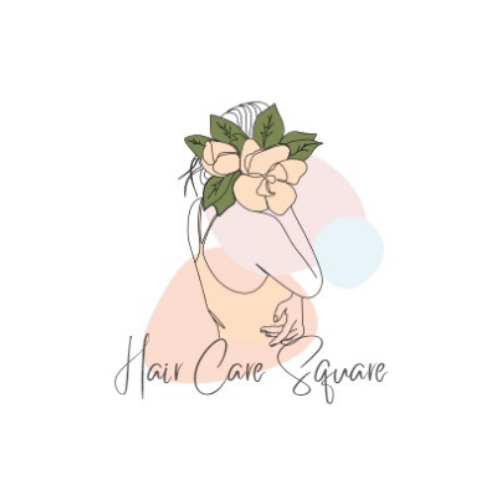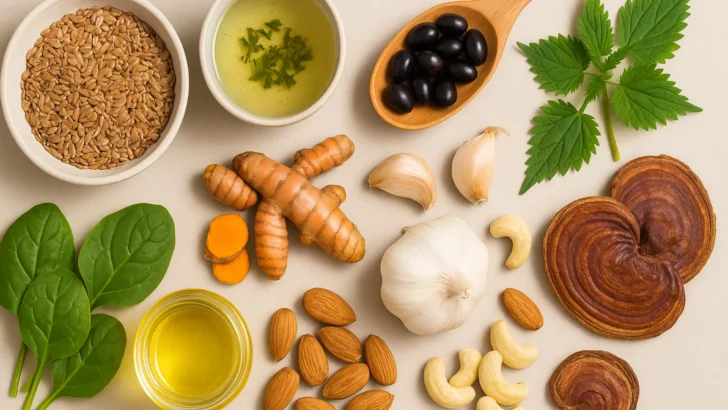If you’ve been watching more hair strands spiral down the drain lately, I have some good news for you. Whether you’re dealing with a receding hairline, thinning crown, or unexpected shedding, there’s one hormonal villain often lurking behind the scenes: DHT. But what if the answer isn’t buried in a bottle of prescription meds or pricey serums? What if the key to stopping hair loss lies in your kitchen or garden?
Here’s a list of natural DHT blockers that are backed by science, revered by holistic dermatologists, and trusted by trichologists worldwide to stop your hair loss naturally.
First, What Is DHT? And Why Is It Wreaking Havoc On Your Hair?
DHT, or dihydrotestosterone, is a powerful androgen (a type of hormone) derived from testosterone. While it plays a crucial role in male characteristics and libido, it also binds to receptors in your scalp and shrinks hair follicles, causing them to miniaturize over time.
The result? Weaker strands, shorter growth cycles, and eventuallyhair loss.
This is most commonly seen in androgenetic alopecia (also known as male or female pattern baldness), which affects over 50 million men and 30 million women in the U.S. alone.
Why Choose Natural DHT Blockers Over Medication?
Okay, so here’s the thing meds like finasteride and dutasteride do work to block DHT (that hormone messing with your hair). But they also come with a bunch of not-so-fun side effects: think mood swings, low libido, and hormonal chaos.
That’s why a lot of people are switching to natural DHT blockers. They’re way gentler on your body, don’t mess with your hormones, and actually nourish your scalp and hair instead of just treating the symptoms. Plus, many of them (like pumpkin seeds or green tea) are good for your overall health too.
Natural DHT Blockers That Actually Work
Let’s deep dive into the most effective and science-backed natural DHT blockers, categorized for easier understanding and integration into your daily routine.
Saw Palmetto
Let’s talk about one of the best natural DHT blockers, saw palmetto. It’s this little berry that grows in the southeastern U.S., and it’s been used in herbal medicine forever.
So, what makes it special? It basically blocks the enzyme (5-alpha-reductase) that turns testosterone into DHT, the hormone that’s thinning your hair. And it’s one of the few natural ingredients that targets both Type I and II forms of that enzyme.
Pretty impressive for a berry, right?
You can take it as a supplement, usually around 160 to 320 mg a day, or look for it in scalp oils and serums made to help with hair fall. And yes, this one’s got science on its side. A 2012 study found that people using saw palmetto topically actually saw fuller hair and less shedding. So yeah, it’s not just hype.
Last update on 2026-02-20 / Affiliate links / Images from Amazon Product Advertising API
Pumpkin Seed Oil
Okay, this one’s a total gem. Pumpkin seed oil is made by cold-pressing pumpkin seeds, and it’s packed with zinc and these plant compounds called phytosterols that help block DHT naturally.
Here’s how it works:it slows down the same 5-alpha-reductase enzyme that turns testosterone into DHT. Plus, it has anti-inflammatory benefits, which means it calms your scalp while working on hair fall.
You can take one tablespoon a day (yep, just drink it) or use it in DIY hair masks. It also makes a great pre-shampoo oil if your scalp needs some extra love. Bonus? It’s loaded with omega-3 and omega-6 fatty acids, so it not only helps with hair loss but also leaves your strands softer, shinier, and way less brittle.
Last update on 2026-02-20 / Affiliate links / Images from Amazon Product Advertising API
Green Tea
Green tea isn’t just a relaxing drink, it’s loaded with a powerful antioxidant called EGCG (short for epigallocatechin gallate, but don’t worry, no one pronounces it right). This little compound is kind of a big deal when it comes to hair.
Why? Because EGCG helps block DHT production while also boosting blood flow to your scalp. That means your hair follicles get more oxygen, more nutrients, and way more support to stay strong and active.
You can sip on 2 to 3 cups a day, use it as a weekly hair rinse, or try scalp serums that include EGCG as an active ingredient. It’s simple, soothing, and surprisingly effective, basically self-care with benefits.
Last update on 2026-02-20 / Affiliate links / Images from Amazon Product Advertising API
Last update on 2026-02-20 / Affiliate links / Images from Amazon Product Advertising API
Flaxseeds
Flaxseeds might be small, but they seriously pull their weight when it comes to hair health. These fiber-rich ingredient helps balance hormones, improve digestion, and support hair growth too.
The magic comes from lignans, which naturally block the 5-alpha-reductase enzyme (aka the one responsible for turning testosterone into DHT). On top of that, flaxseeds are full of ALA, a plant-based omega-3 that helps keep your strands strong, shiny, and less prone to breakage.
Just toss 1 to 2 tablespoons of ground flaxseed into your daily smoothie or yogurt. And if you’re feeling a little DIY, you can even make flaxseed gel and use it as a hair mask, it’s lightweight, soothing, and pretty easy to whip up.
Last update on 2026-02-20 / Affiliate links / Images from Amazon Product Advertising API
Last update on 2026-02-20 / Affiliate links / Images from Amazon Product Advertising API
Stinging Nettle Root
Stinging nettle root has been a go-to in herbal medicine for centuries, especially in European countries and it turns out, your hair loves it too. This plant is loaded with silica and iron, which not only nourish your hair but also help block DHT from doing its damage. It also boosts blood flow to your scalp, which means more nutrients and oxygen get to your hair follicles basically creating the perfect environment for growth.
You can take it in capsule form (just check with a practitioner first), sip it as a tea, or use it as a scalp rinse. It’s a low-effort, natural way to support your hair from the inside out.
Last update on 2026-02-20 / Affiliate links / Images from Amazon Product Advertising API
Last update on 2026-02-20 / Affiliate links / Images from Amazon Product Advertising API
Turmeric
Turmeric isn’t just for lattes or skincare, it’s actually a secret weapon when it comes to hair health. The active compound in it, curcumin, has some serious anti-inflammatory and antioxidant powers. It also helps block DHT by calming down those androgen receptors that love to mess with your hair.
You can enjoy it the cozy way by sipping on golden milk (just mix turmeric with plant-based milk and a pinch of black pepper), or get hands-on with a turmeric scalp mask. Mix it with honey and aloe, and you’ve got a calming, DHT-fighting treatment that feels like a mini spa day for your scalp.
Last update on 2026-02-20 / Affiliate links / Images from Amazon Product Advertising API
Reishi Mushroom
Reishi mushroom has been a staple in traditional Chinese medicine for ages, mostly for its anti-aging and immunity-boosting powers. But here’s what most people don’t know: it’s also a natural DHT blocker. Reishi helps slow down the 5-alpha-reductase enzyme (the one that turns testosterone into hair-thinning DHT) and boosts circulation, which gets more nutrients flowing to your scalp.
You can take it as a capsule or make your favorite mushroom recipe and hack your way to stronger strands.
Last update on 2026-02-20 / Affiliate links / Images from Amazon Product Advertising API
Garlic
Garlic might not be the first thing you think of for hair care, but don’t sleep on it. This little kitchen staple is actually packed with benefits that go way beyond flavor. It boosts circulation, detoxes your scalp, and helps create the perfect environment for new hair to grow. The real star here is allicin, that’s the compound in garlic that helps improve blood flow and may even help flush out excess DHT from your system.
You can easily add raw garlic to your meals (just maybe keep mints handy), or try a DIY garlic hair mask if you’re feeling bold. Just do a patch test first, your scalp may love it, but your nose might need time to adjust.
Last update on 2026-02-20 / Affiliate links / Images from Amazon Product Advertising API
Last update on 2026-02-20 / Affiliate links / Images from Amazon Product Advertising API
Zinc-Rich Foods
Zinc might not get as much hype as biotin, but trust me it’s a major player in the hair health game. This mineral helps keep your hormones balanced and actually blocks the 5-alpha-reductase enzyme, meaning less DHT messing with your scalp. Plus, zinc supports overall scalp health and keeps your follicles working the way they should. Basically, it’s one of those nutrients your hair can’t grow without.
Some of the best sources? Almonds, cashews, chickpeas, lentils and if you’re into seafood, oysters are a zinc powerhouse.
Last update on 2026-02-20 / Affiliate links / Images from Amazon Product Advertising API
Biotin & Silica Boosters
Okay, these might not block DHT directly, but they’re still total game-changers when it comes to keeping your hair strong, shiny, and growing like it should. Think of them as your hair’s support squad. Foods like spinach, oats, and cucumber are packed with the good stuff like biotin, silica, iron, and B vitamins that help strengthen your strands from the inside out. They don’t just help prevent breakage, they also create the right conditions for new growth to actually stick around.
So if you’re building a hair-friendly diet, these are non-negotiables. Toss some spinach in your smoothie, sprinkle oats on everything, and slice up cucumber for hydration with benefits. Your hair will love it.
Last update on 2026-02-21 / Affiliate links / Images from Amazon Product Advertising API
What To Expect (& When)?
Look, hair growth isn’t instant, there’s no magic overnight fix. But if you stick with natural DHT blockers consistently, you will start noticing shifts.
Here’s the real talk timeline:
- Around 4 to 6 weeks, you might see less hair fall in the shower or on your pillow.
- By month 3 or 4, those cute little baby hairs may start popping up around your hairline.
- At the 6-month mark, people might start asking if you did something different because your hair will look fuller and feel stronger.
The secret? Stay consistent. Get enough sleep. And don’t slack on scalp care, it’s just as important as the products you’re using.
What To Avoid (If You Want Results)
Even the best DHT blockers won’t save your hair if your daily habits are working against you.
A few things to cut back on:
- Too much sugar as it spikes insulin, which can lead to more testosterone (and yep, more DHT)
- Refined carbs and junk food
- Alcohol and smoking as both mess with blood flow and boost stress hormones, which don’t help your follicles at all.
Are Natural DHT Blockers Worth Your Time?
100% yes. If you’re looking for a gentler, long-term fix that helps your hair and your overall health, natural DHT blockers are totally worth a shot. It’s not about chasing miracles, it’s about building a routine that works with your body, not against it. Clean, simple ingredients. Minimal side effects. And results that actually last.
Because honestly? Great hair isn’t just about what you put on it. It’s about how well you treat the roots from the inside out.

